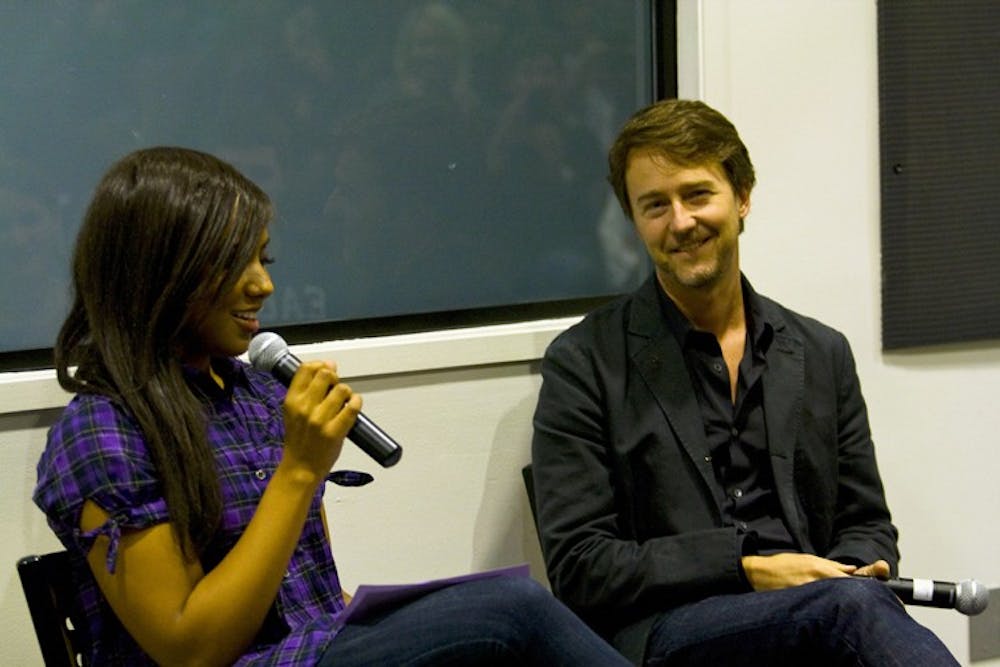Edward Norton is the poster boy for character actors everywhere. While most may recognize him as the deranged and radical Tyler Durden from “Fight Club,” Norton manages to stand out amongst Hollywood’s most talented thespians. From playing a skinhead in “American History X” to a revamped Bruce Banner in “The Incredible Hulk,” Norton prides himself on his ability to completely blend into the characters he plays.
“I don’t really tend to approach [films] thinking about how they interact with me,” Norton said in an interview with The Eagle. “I just am not that interested in splattering myself out there.”
In one of their first big events of the year, ThinkTalk, a D.C.-based television program, and the AU Film Society hosted a Q&A with the famed actor. Students filled up Ward 2 to ask him a couple of their own burning questions, which ranged from asking how life-changing “Fight Club” was to his experience with documentary films. In addition, Norton discussed some films that have personally influenced him, such as Spike Lee’s groundbreaking “Do the Right Thing” and films from Terrence Malick and Milos Forman.
In his most recent work, “Stone,” Norton plays the titular character, a criminal from Detroit trying to get parole after serving eight years of a fifteen-year jail sentence. Stone is the stereotypical thug, complete with cornrows and a foul mouth. Most of the film takes place inside the office room of Stone’s parole officer, Jack Mabry, played by Robert De Niro. While true Norton fans know that this is not his first film playing a criminal, Norton dispels any queries that “Stone” is an action-packed thriller with a secondary script.
“There’s no chase scenes and no weapons,” Norton said. “The drama in this film comes from this cork-screwing tension that just evolves in conversation. So if you’re an actor, it’s like, ‘At last — I matter!’”
In order to accurately portray Stone, Norton and “Stone” director John Curran traveled to prison facilities just north of Detroit to research exactly how they should model Stone.
“A lot of the people we were interested in were coming out of the gang and drug culture in southwest Detroit ... John and I spent a lot of time mining what they said and transferring it over into the script,” Norton said. “Literally, for the sound of my voice, there was this one guy in particular we met who had a very broken, gravelly, strange sort of voice. John and I both found it very hypnotic.”
Along the course of the film, Stone discovers religion, which changes the entire theme of the movie. It is not solely about spiritual awakening, but rather about dealing with morals and convictions. It was not a personal application for Norton, so much as it was for Curran.
“To me, the specifics of what Stone gets into are beside the point,” Norton said. “What I liked was that John was aiming at opening up the question of ‘how does one assert that there’s only one way for a person to achieve illumination?’ Or one text, or one notion of how we communicate with the divine or get a sense of the divine?”
Norton was truly inspired by Curran’s take on directing and his opportunity to have a very hands-on role in the development of this film. As an actor for the past 12 years, Norton has amassed a wealth of knowledge about the film industry that he is keen to share with others.
“I think that people coming up now need to push against the model in their own ways. I would tell filmmakers to take inspiration from Radiohead and what they did, self-releasing their record to people. I’m excited to see how people leave the film distribution industry behind and stop worrying about how they’re going to find a way to get embraced by the mainstream, because that model’s going to be dead someday, sure as the record industry is going to be dead.”
This advice is something that Norton lives by, having produced and directed “Keeping the Faith” himself, as well as producing eight other films and documentaries. His accomplishments even caught the eye of the White House, and Norton was appointed to serve in the Committee on the Arts and Humanities alongside such actors as Forrest Whittaker and Sarah Jessica Parker.
“We’re there to advise the President on policy decisions about where to allocate funds for the most effectiveness. One project recognizes and awards small after school arts programs that work with at-risk kids. So, within our budget we give these awards to about two dozen groups per year,” Norton said.
It’s clear that the multi-talented actor has tried his hand at a number of different careers, succeeding at whatever he works on. “Stone” is out in theaters everywhere.
ydesta@theeagleonline.com





